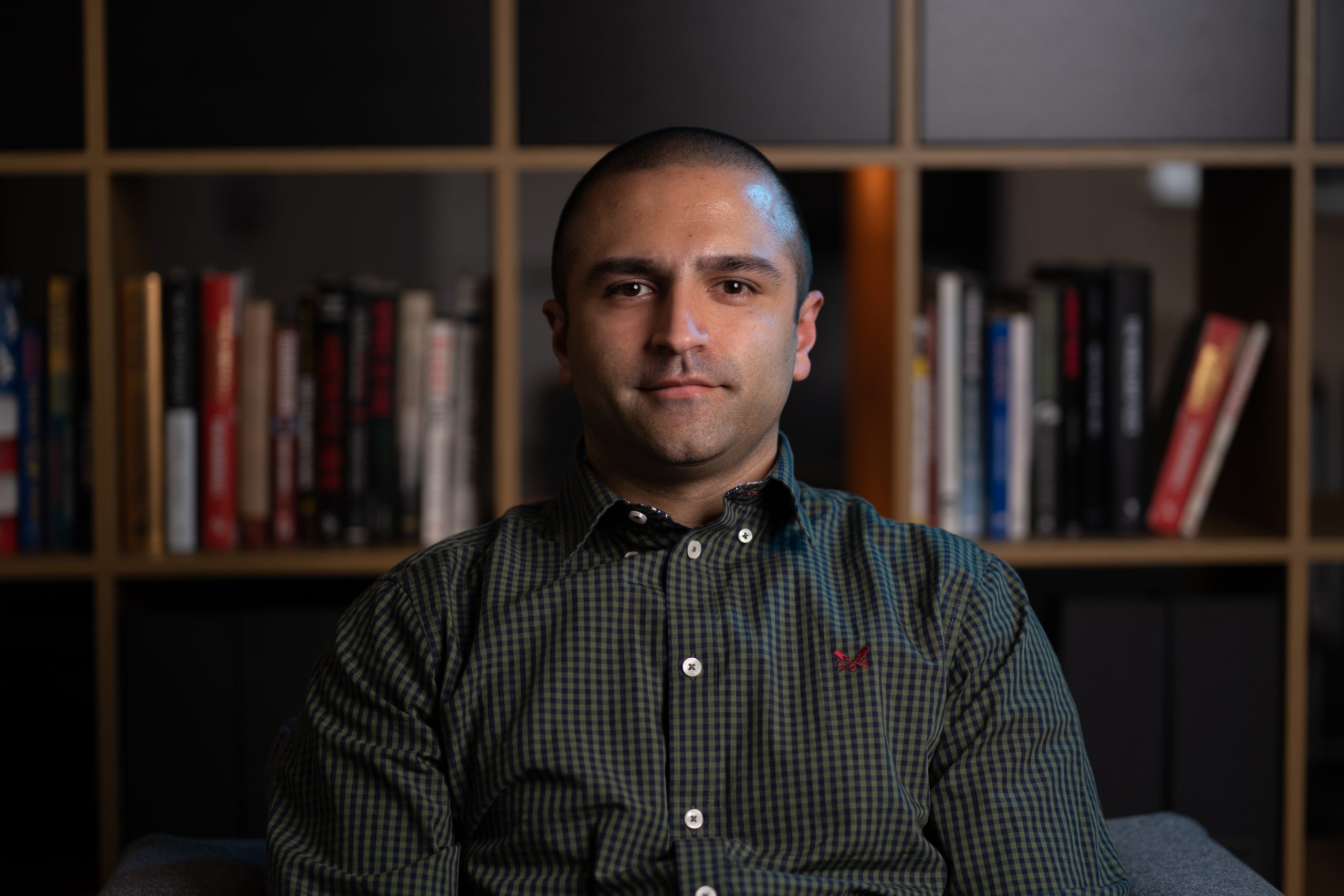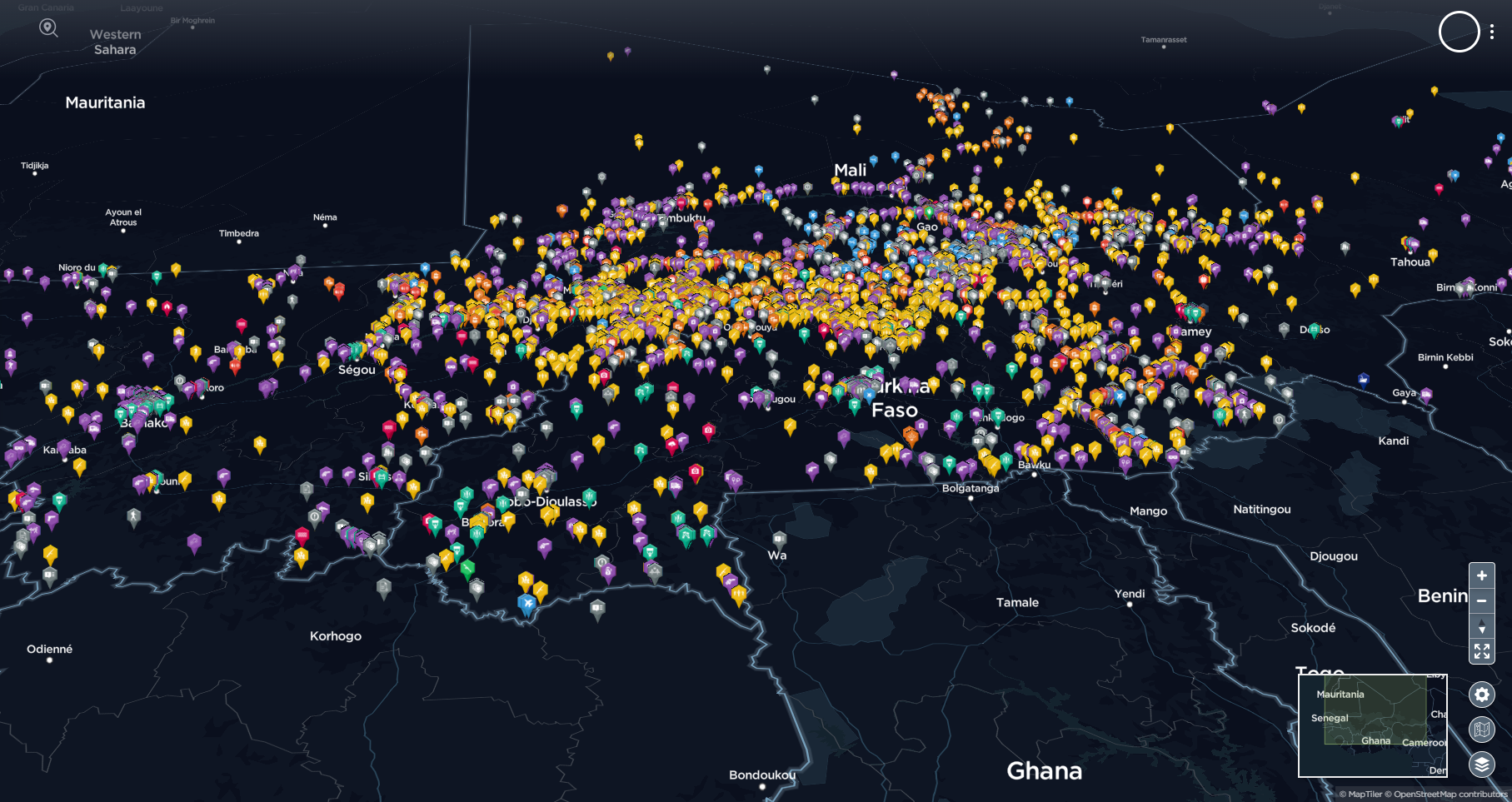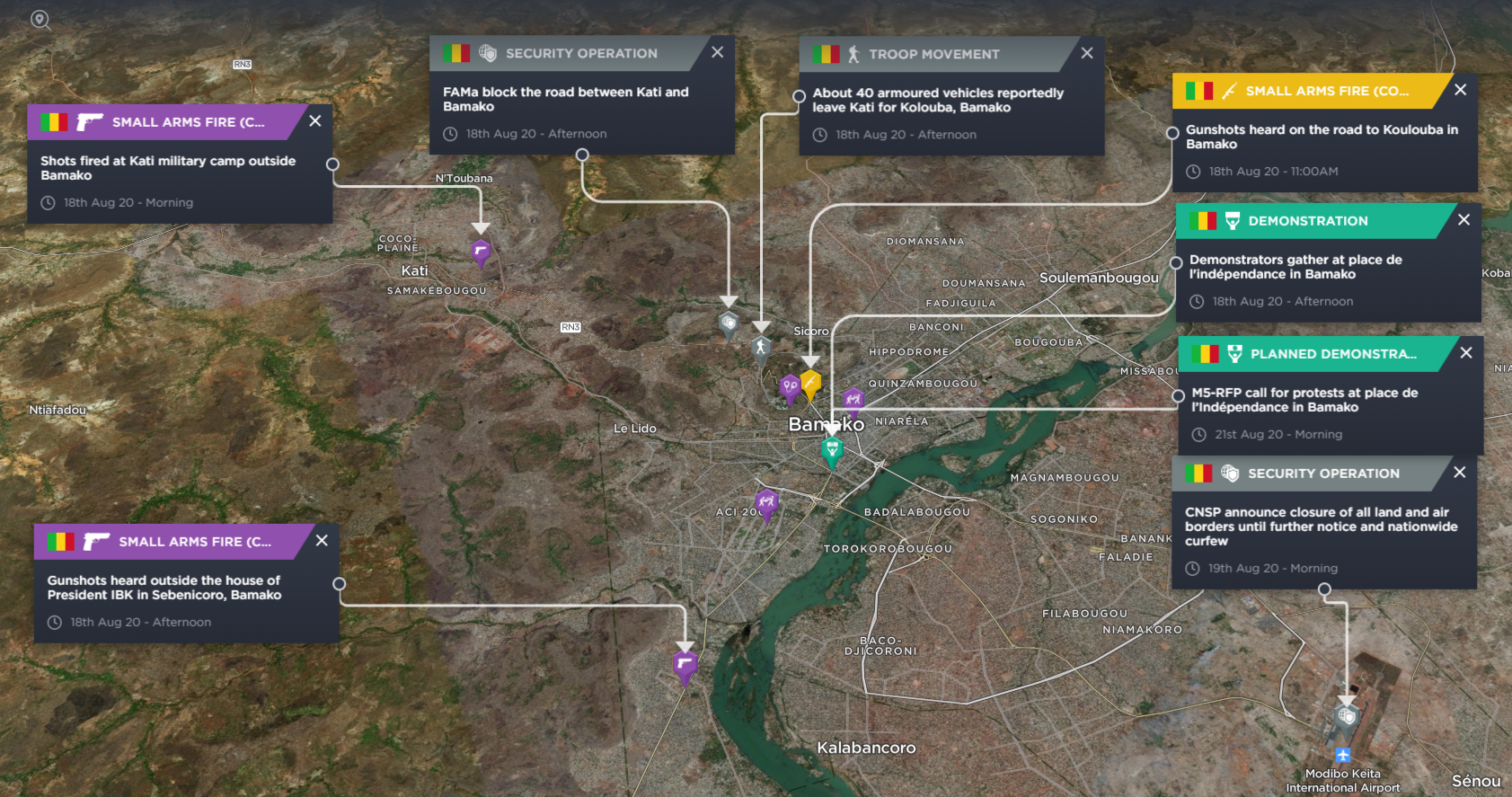Coup d’etat in Guinea: What happened, why did it happen, and what happens next?
The Guinea Coup – the third successful coup in Africa to take place in 2021 – led by Lieutenant-Colonel Mamady Doumbouya of the Special Forces Group (GPS), has led to the removal of power of controversial President Alpha Conde, and sent shockwaves through some of its surrounding West African neighbours, where similar conditions to those that led to the coup in Guinea exist. While the swift and sudden nature of the coup caught many off guard, with the GPS forces gaining access to the Presidential Palace and detaining President Conde within a matter of hours, the tensions that led to the coup have been growing for some time. This report will take a look at the events of the Guinea coup, what led to the coup, and what might come next in the country.
- Anger and dissatisfaction with the President Conde-led government has been growing since 2019 with the opposition accusing him of pushing for the amendment of the constitution to remain in power. Anger at poor living conditions, corruption and poverty also drove many to reject President Conde.
- Tensions have been reported within the armed forces over 1) Lieutenant-Colonel Mamady Doumbouya’s desire to make the GPS autonomous from the Ministry of Defence and 2) moves by President Conde to lower the armed forces’ budget.
- Opposition politicians, parties and groups have welcomed the coup along with the military hierarchy.
- There is likely to be an increase in protests in the short and medium-term, including against mining companies, as protesters, who may view the CNRD as more receptive, may seek to press home their demands.
- Concerns around poor governance, unemployment, free and fair elections, insecurity, corruption and service delivery are among the sources of anger among many in West African and Sahelian countries and there are signs that political instability is rising.
What happened in the Guinea coup?
On 4th-5th September 2021, the Special Forces Group (GPS), led by Lieutenant-Colonel Mamady Doumbouya, led a force, purportedly of about 50 trucks, to Kaloum, Conakry, from their base in Forecariah, reportedly taking up positions in Kaloum on 4th September. After an exchange of fire with the Presidential Guard outside the Presidential Palace, the GPS, within hours, managed to gain access into the Palace and detain President Alpha Conde, later taken to an unknown destination.
Though casualty counts are unverified, seven soldiers of the Presidential Guard are said to have been killed during fighting around the Presidential Palace. Gunfire was also reported in the Camayenne and Coleah areas outside of Kaloum. Early reports indicated three soldiers were killed and two more wounded in Camayenne. Presidential Guard soldiers also cordoned off the November 8 Bridge.
The CNRD (National Committee for Rally and Development), the ruling military junta, later announced the suspension of the constitution, a curfew (later lifted in areas of mining) was introduced with the police and gendarmerie asked to ensure it is enforced, and the CNRD also announced that regional governors, prefects and sub-prefects would be replaced with army officers.
Reports later emerged that heavily armed soldiers raided the home of the Chief of General Staff of the Armed Forces, General Namory Traoré.
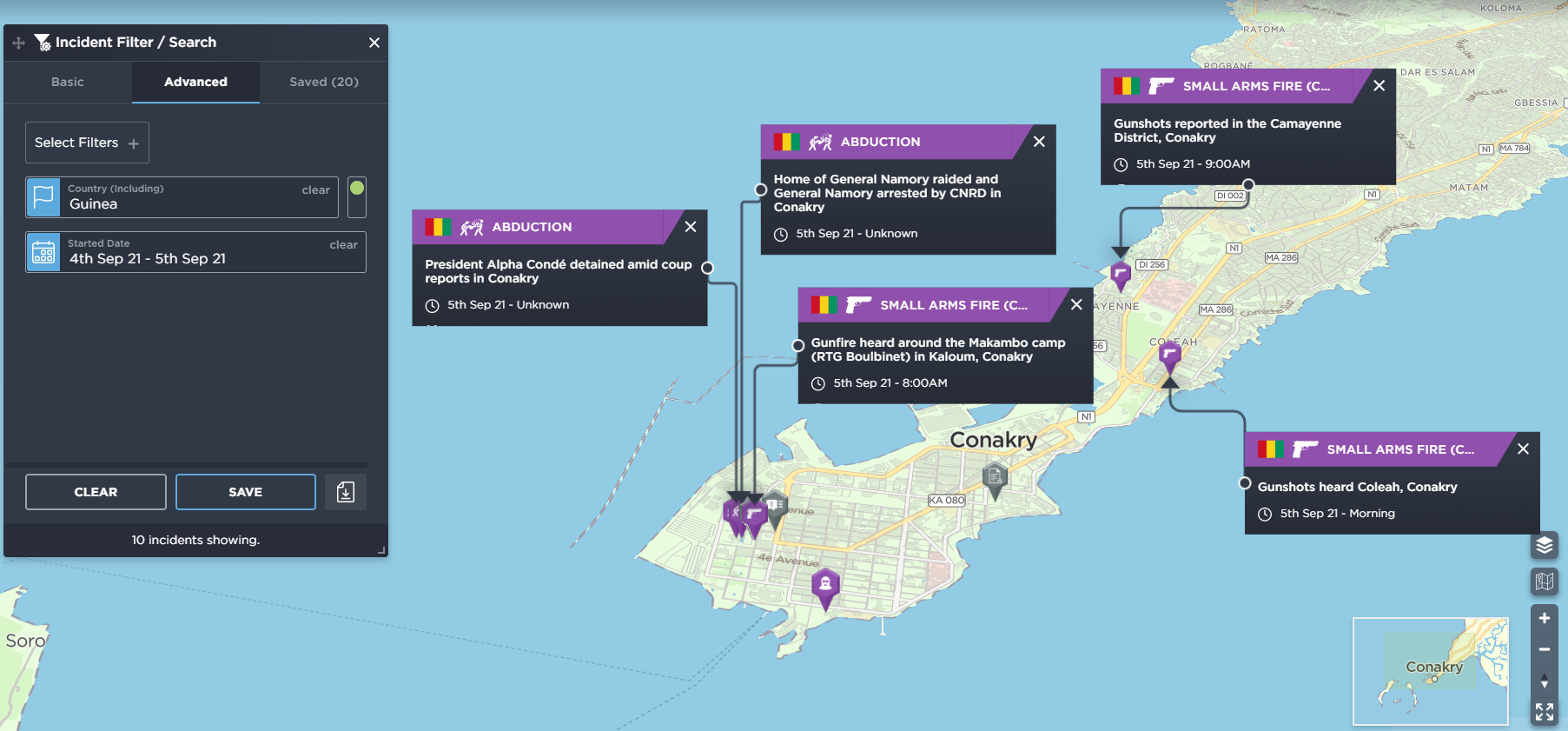
How the events of the coup in Guinea played out - President Alpha Conde was detained just hours after the first gunshots were reported in Conakry
Key developments after the coup in Guinea
- Former government ministers have been banned from travelling during the transition period
- Soldiers of the now former Presidential Guard were ordered, on 6th September, to immediately join the Km36 Rapid Intervention Group, located in the outskirts of Conakry
- Lieutenant-Colonel Doumboya ordered the lifting of the curfew in mining areas and called on mining companies to continue their activities and stated that signed contracts will be complied with. Maritime borders were also reopened to allow mining companies to resume operations.
- Dozens of FNDC (le Fronte Nationale pour la défense de la constitution) protesters gathered around the Coronthie prison and Ignace Deen University Hospital to demand the release of political prisoners. Protesters were dispersed with tear gas.
- Lieutenant-Colonel Doumboya promised a unity government will be set up to lead the transition. He also ordered the Ministry of Justice to release all political detainees in consultation with the prosecutor, the prison administration and the group of lawyers of political prisoners. 79 political prisoners were released on 7th September, a move welcomed by human rights activists and the political opposition and their supporters.
- ANAD, a coalition that supported the candidacy of the UFDG president during the elections in 2020, expressed support for the CNRD, stating that they completed the “fight led by ANAD and others for justice and democracy” against “the dictatorial regime of Alpha Condé”.
- The chamber of commerce and industry expressed support for the CNRD
- Guinea’s main opposition leader and president of the UFDG (Union des Forces Démocratiques de Guinée), Cellou Dalein Diallo, said on 8th September that he had not yet been consulted about the transition but was ready to participate in talks.
- Civil society organisations called on the CNRD to define a transitional timetable for a return to constitutional order and for an investigation into deaths in connection with the events of 5th September
- During a meeting between the CNRD and the military hierarchy on 7th September, the latter pledged allegiance to the CNRD. Soldiers have been ordered to return to their barracks to avoid disorder.
- The FNDC welcomed the coup but called for all actors to work together to ensure the return to democratic process
- The CNRD announced the dismantling of PAs from 7th September. PA units were installed in November 2018 along Autoroute Le Prince in Conakry to reduce protest disruption.
- The contents of a statement released by the RPG Arc-en-ciel, the party of President Conde, is rejected by some supporters of the party who view it as not being critical enough of Lieutenant-Colonel Mamady Doumbouya
- On 9th September, the CNRD ordered the central bank and other banks to freeze all government accounts to “secure state assets”
Rising discontent and internal tensions - what led to the coup?
Prior to the coup in Guinea on 5th September, a clear indication of dissatisfaction with President Conde’s plans to amend the constitution and remove the two-term limit was the formation of the FNDC in 2019, a movement formed by several opposition parties and civil society organisations. Other less prominent movements, such as Les Brassards Rouges were also formed.
The FNDC initiated a series of civil obedience campaigns and protests across the country. Protests also took the form of strikes or ‘dead city’ days where commercial activities were paralysed. Clashes frequently broke out between protesters and security forces, with resulting civilian casualties and the arrests of dozens of activists and protesters, including FNDC leaders.

FNDC organised 331 out of the 1012 protests recorded by Intelligence Fusion in Guinea since 2019
The movement weakened in September 2020, weeks before the general election after the UFDG left the FNDC, along with two other parties, to contest the election which saw the re-election of President Conde for a third term.
Recent months had seen escalating rhetoric and renewed calls for protests against the Conde-led government. In July 2021, the UFDG called for protests in August 2021 after school exams were complete. ANAD also backed the call and the FNDC, after the arrest of two ANAD members, had also called for protests to demand the departure of President Conde and the release of political prisoners. The government, citing COVID-19, announced that no protest would be authorised.
Anti-government sentiment among many, however, remained. Poor living conditions have contributed to anger with President Conde and protests over poor roads and service delivery are common. Lieutenant-Colonel Mamady Doumbouya, during his first televised speech cited the socio-political and economic situation of the country, economic mismanagement, the dysfunction of government institutions, the disrespect of democratic principles, among other reasons, as justification for the coup by the CNRD.
The day before the coup, detecting discontent in the army, President Conde had suggested that he would cut the army budget, infuriating Generals Namory Traoré (Chief of Staff of the Armies) and Ibrahima Baldé (High Commander of the Gendarmerie). Purported discord within the armed forces has also been reported over Lieutenant-Colonel Mamady Doumbouya’s desire to make the GPS autonomous from the Ministry of Defence.
The impact of the Guinea coup
Business impact
The military coup in Guinea, the second-largest exporter of bauxite (a source of aluminium), caused uncertainty in the global aluminium supply chain, leading to prices of the metal to rise to a 10-year high. Although Lieutenant-Colonel Doumboya ordered the lifting of the curfew in mining areas for companies to resume operations and assured that state contracts with mining companies will be honoured, continued political uncertainty will keep prices of aluminium high. China, who imports more than half of their bauxite from Guinea and sees the Simandou project as an important geostrategic project, issued a statement demanding the release of President Conde. Similar sentiments were also issued by Russia, concerned about the impact of the political situation on operations of RUSAL.
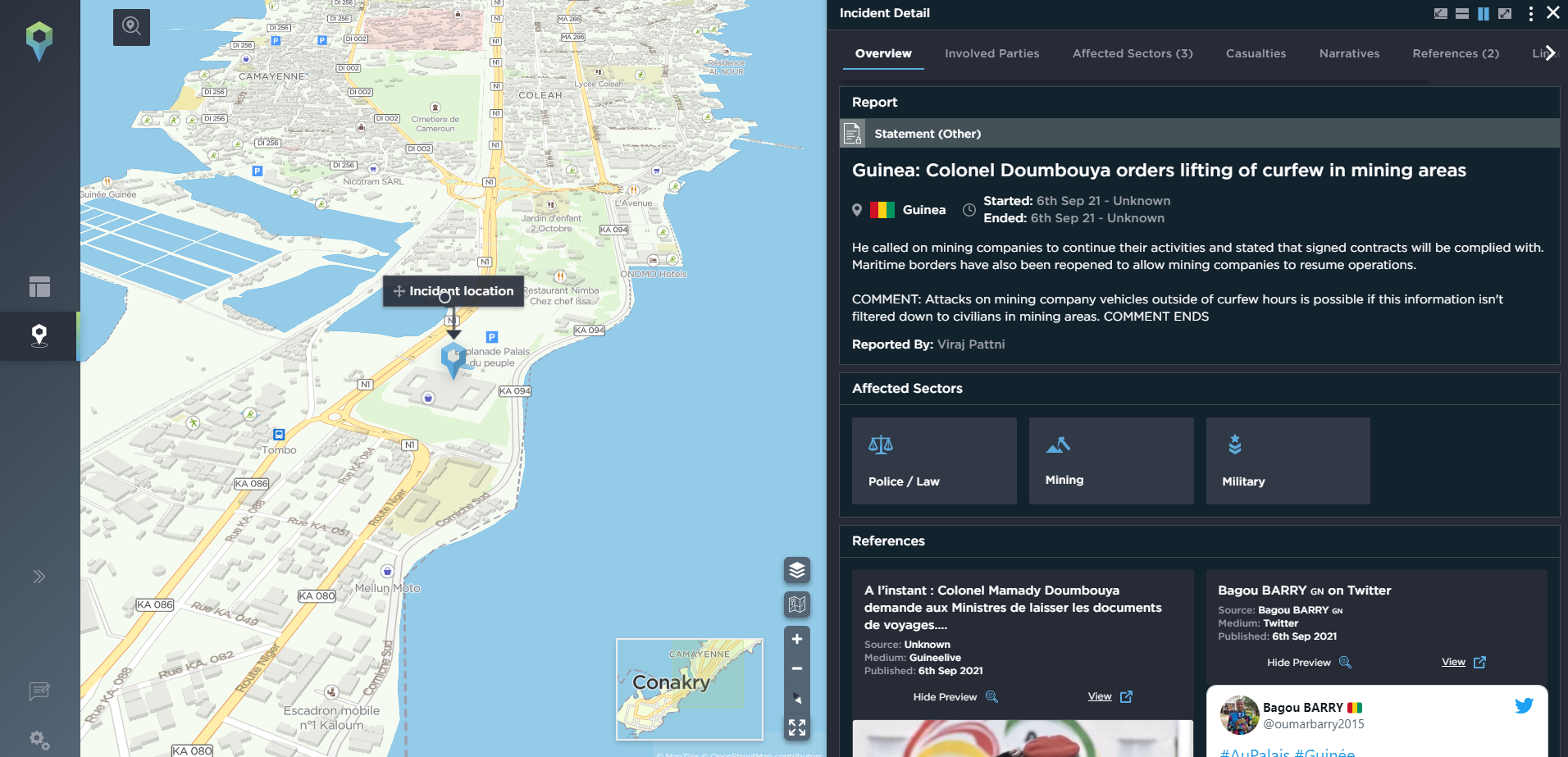
Lieutenant-Colonel Doumboya lifted the curfew in mining areas so that companies could resume operations
Regional reaction
Following the coup, West Africa’s main political and economic bloc, ECOWAS, suspended Guinea’s membership. No sanctions have been imposed yet as talks between the block and the CNRD continue. Other West African governments will remain wary of contagion and coups in their own respective countries; the coup in Guinea is the third coup in Africa this year after Chad and Mali. Coup attempts have also been reported in Niger, Benin and Guinea-Bissau this year. Concerns around poor governance, unemployment, free and fair elections, insecurity, corruption and service delivery are themes that have caused frustration to build among many in West African and Sahelian countries. Following the coup in Guinea, the Guinea-Bissau military ordered all soldiers to remain in their barracks, an indication of fear in the region.
Summary of instability in West Africa
2021 has seen the emergence of the Fix The Country movement in Ghana over economic hardship and living conditions. Nigeria has also seen a rise in separatist group activity, in part driven by concerns around security. Indeed, growing cases of abductions of school students, for instance, and activities of bandits in north-western Nigeria along with economic hardship have put pressure on the Buhari government. Anti-government protests are planned to take place in October 2021. Calls for the government to resign have been made in Guinea-Bissau over concern with the levels of public debt. In February, President Embaló made changes to the military leadership after reporting an attempted coup. Anger towards the government over tax increases and the cost of living remains, and public sector workers have launched a number of strikes with improved working conditions among their demands. In Senegal, there have been concerns around the freedom of protest and increased police surveillance. Mass protests also broke out following the arrest of opposition leader Ousmane Sonko. In Niger, 48 hours before the inauguration of President Bazoum, the presidential guard prevented a group of armed soldiers from approaching the Presidential Palace. Several soldiers were later arrested after the alleged coup attempt. The incident occurred during a climate of distrust following disputed elections, after violent post-election protests. Concerns over political persecution remain in Togo. In Benin, a senior judge fled the country in April 2021, citing political pressure to convict and detain an opposition candidate. Protests also broke out in Cotonou and other cities over the extension of President Talon’s mandate by a month prior to elections. The Minister of Interior, in April, claimed to have prevented an attempted coup. In Burkina Faso, nationwide protests against insecurity highlighted the pressure on the government. In recent months, concerns over the increased cost of living has led to protests or calls for protests in several West African/Sahelien countries. Although not large in scale, they are representative of worsening living conditions and will add to further pressure on governments.
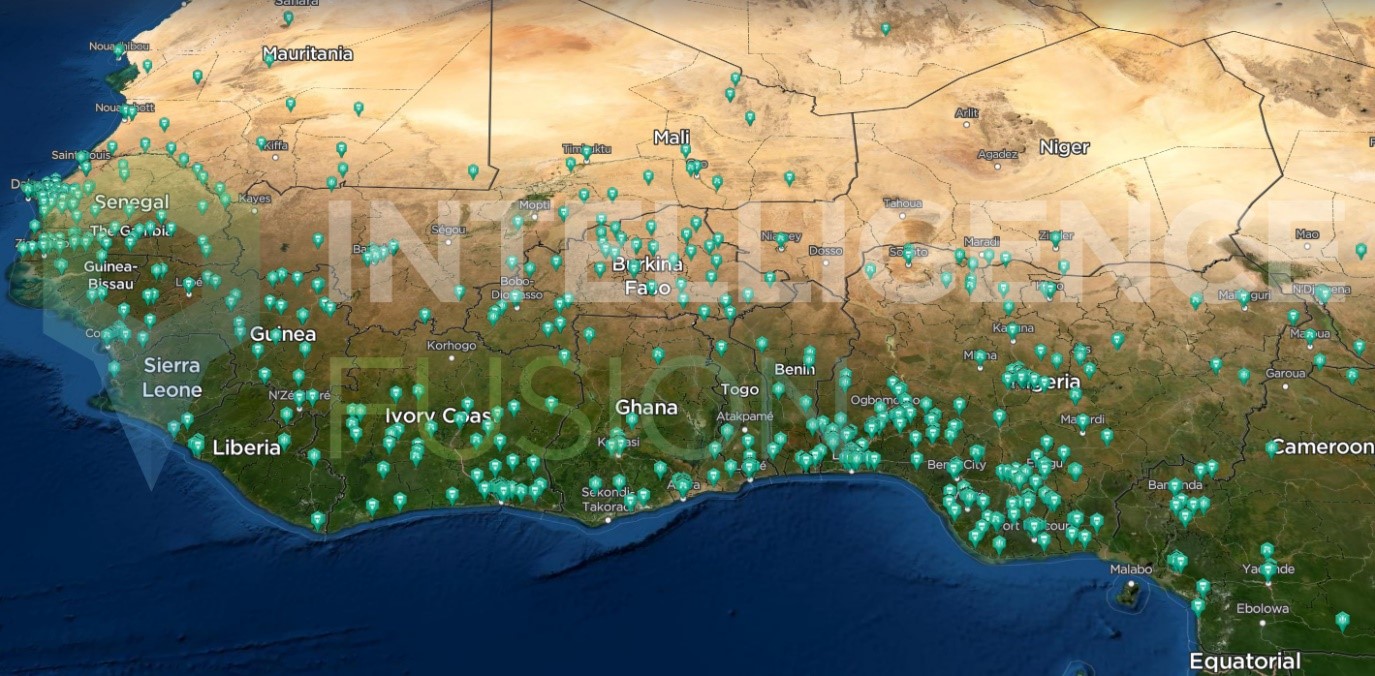
1,374 protests in West Africa since the start of 2021, a slight increase from 2020
Challenges and threats ahead - what comes next following the coup?
The GPS-led coup has led to wild celebrations in Guinea, particularly in Conakry and several other cities in the interior. However, pressure on the CNRD will quickly grow politically if there are delays in the political transition. Although Lieutenant-Colonel Mamady Doumbouya has promised a consultation process with a view to forming a unity government, Guinean civil society organisations have already formed a ‘crisis unit’ to monitor the socio-political situation during the transition period, and have called for the authorities to define a transitional timetable for the quick return to constitutional order and have sought reassurances related to the threat to democracy and human rights. Adhering to a transitional period will be fundamental to maintaining trust in the transition process and the CNRD.
The involvement of political and civil society groups in the political transition is necessary to avoid feelings of exclusion emanating from groups or movements as has been the case with the M5-RFP in Mali, for example, where the military is seen as playing an excessive role in the transition. There is also an inter-communal violence risk attached if some ethnic groups are seen as benefiting more than others throughout the transition. This is also possible in the short-term as ethnic groups considered sympathetic to President Conde attack people from other ethnic groups.
Throughout the transition period too, protests against poor infrastructure such as roads, electricity and water, are likely to continue and any heavy-handed response by military officials will quickly see opposition grow against the CNRD, further adding to political instability. There is likely to be an increase in protests in the short and medium-term, including against mining companies, as protesters, who may view the CNRD as more receptive, may seek to press home their demands.
Intelligence Fusion’s global coverage, led by a 24/7 operations team of military-trained analysts, means we will be able to continue to closely monitor the situation in Guinea, and in West Africa as a whole – keeping our clients in the region informed on all the latest developments following the Guinea coup. To learn more about our threat intelligence platform, or to try it out for yourself, get in touch with a member of our team today.
